Adventure Is Accessible When You Think Outside the Box
Meet the Wisconsin woman wheeling around the world.
In Atlas Obscura’s Q&A series Exploration for Everyone, we chat with everyday adventurers and dauntless world travelers about finding wonder without limits.
“Come on in, find a seat—I’ve already got one,” Kory Macy says with a sly grin, nodding at her wheelchair as she leads the way into her living room. A wide window looks out onto a picturesque, wooded area on the north side of Madison, Wisconsin—but it’s what’s inside that catches the eye. The modest apartment she shares with her husband John and two cats is full of framed art, photos, and other souvenirs from her travels across five continents. There’s an entire wall of selfies: dogsledding across a snowy landscape, sitting on a Galápagos beach as seals laze in the background, steering an adaptive bicycle, kayaking, skydiving. On bad days, Macy says—and there are bad days—the photos remind her of what she’s capable of, and all the travel still to do.
Nearly 20 years ago, Macy, now in her mid-40s, was diagnosed with a rare degenerative condition called ataxia with oculomotor apraxia type 2 (AOA2). Over time, AOA2 has reduced her mobility and impaired her speech. But the disease hasn’t quelled her wanderlust or her delight in new experiences. Macy makes the most of accessible travel options—and she’s part of a growing community of like-minded explorers.
Atlas Obscura spoke with Macy about how she chooses her adventures, what accessible travel means to her, and that time she thought she fell out of a plane at 20,000 feet.
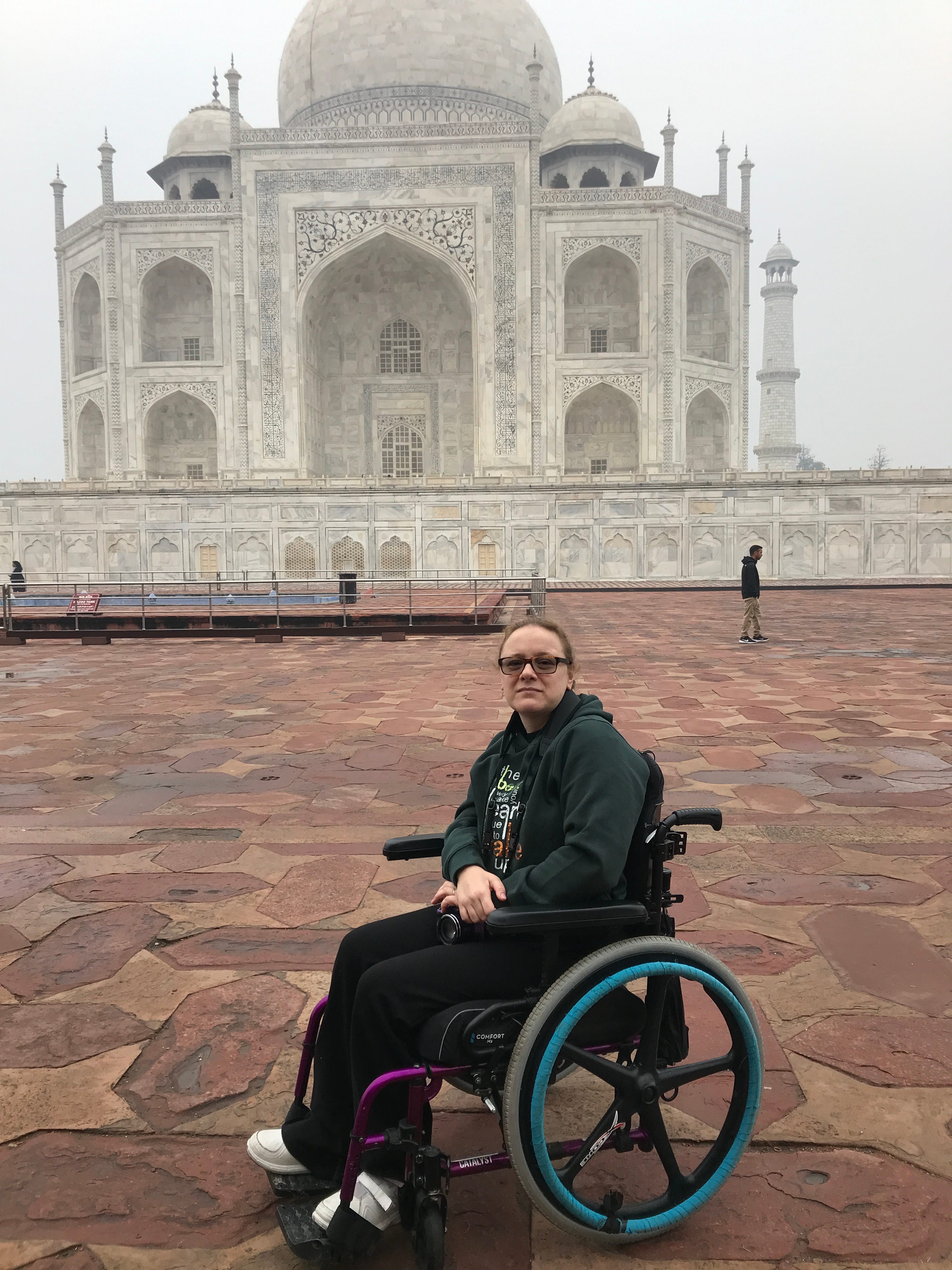
Why do you travel?
First of all, because I can. That is my honest answer. I like meeting people. I’m a people person—obviously, I’m a social worker. So I like meeting people from different areas and seeing different parts of the world.
I also come from a family where everyone does crazy things. My grandmother climbed Kilimanjaro and crossed the Sahara on a camel. My aunt took a bike ride a couple years ago around Myanmar. When I got bat mitzvah-ed, I had a choice between a party or going to Israel. I went to Israel. And my mom was like, “Well, if you’re in Israel, you might as well go to Egypt.” Now, I’ve been paragliding. I’ve been skydiving.
For a lot of people, just the idea of skydiving is terrifying. What made you decide to give it a try?
I get bored. And I usually get spurred on when someone says, “You can’t do that.” I say, “Yeah, watch me.” So I found a company called Start Skydiving in Middletown, Ohio, that works a lot with Wounded Warriors. They had a suit that has a drawstring on the bottom so that, as you land, they pull the string so your legs go up [as you hit the ground].
I was sitting on the edge of the plane at 20,000 feet, and I didn’t hear the guy say, “We’re leaving.” Obviously, it was tandem, and I was strapped to heck to him, but all of a sudden I was flying through the air. And my first thought was, “Oh shit, I fell out of the plane. I’m 20,000 feet up. I’m going to go splat.” Then of course I realized he was at my back. This is all because I get bored.

Do you usually travel on your own or as part of a group?
I mostly travel by myself. I don’t want to slow anyone else down. Inevitably you’re going to get a person who’s not patient, and I don’t want to feel bad about that. I’d rather be alone and take my time.
There’s an inclusive adventure nonprofit in Minnesota called Wilderness Inquiry, and I’ve been canoeing and kayaking with them, and I went to Belize and to Kenya with them. Kenya left a big impression on me. First of all, it was beautiful. I had also just gotten into a wheelchair, and it meant a lot to me to go there, because it’s not something a lot of people in a wheelchair do. Then later, when John and I got married, for our honeymoon, I thought, “Well, I’ve been on the equator in one hemisphere, let’s go to the other.”
Is that how you ended up in Ecuador?
I just googled “disability trips in South America” and found Ecuador For All [now Latin America For All]. The vice president [at the time, Lenín Moreno, who later served as president] is a paraplegic, and he started giving out wheelchairs to people who couldn’t afford them, making curb cuts. [It changed things a lot.] There are ramps now. Some of them are death-defying, but there are ramps.
And you recently spent three weeks in India. What was that experience like?
I found Planet Abled, which plans trips for people with and without disabilities, all different kinds. I had a guy who was with me for those three weeks, and his job was to push, pull, whatever, me up ramps and over things. I went whitewater rafting in the Ganges and I’ve seen pictures of how they got me down [to the water]. I’m so glad I closed my eyes [laughs]. They put me in a little seat and picked me up and carried me over the rocks. I really didn’t like being picked up and carried, but you gotta do what you gotta do. I think it’s good that I couldn’t understand what they were saying. I really didn’t want to hear, “Oh crap, I’m dropping her.”
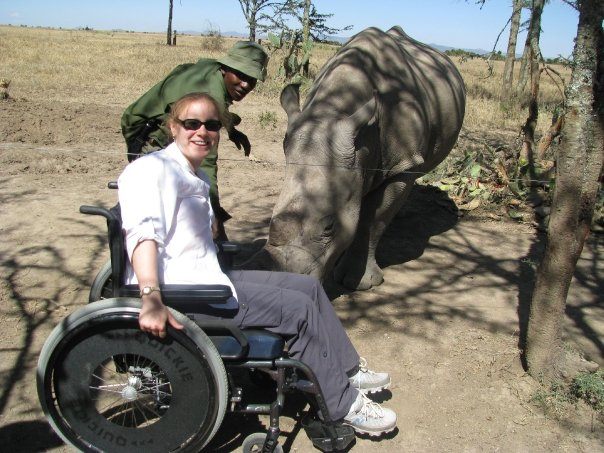
How does AOA2 affect you?
My cerebellum, which controls motor control, is dying, basically. Of a lot of different ataxias, it’s one of the better ones to have; some cause multisystem organ failure. No one really knows where I’m going to end up. My speech is pretty clear right now, but when I’m tired I really slur my words. I can’t hold a pencil properly. I hold my glass with two hands like a little kid. It bothers me, but I choose not to think about it because there’s no point.
So what are you thinking about—your next trip?
We’re thinking about going to Peru, to Machu Picchu. We’re thinking about going again to the Apostle Islands [in Northern Wisconsin] to go kayaking. I have a degenerative condition. I don’t know how fast, or how not-fast, I’m going to deteriorate, so I’m trying to get in as much stuff as I can, before I can’t.
What frustrates you about the state of accessible travel?
If something is technically accessible, I can figure it out. Like with toilets that are just a hole in the floor—I’m holding onto my wheelchair just thinking please don’t fall, please don’t fall. I also wear incontinence underwear, because when you gotta go, you gotta go.
But traveling with a disability is way more expensive. There’s no cheap way to do it. There’s no backpacking and staying in youth hostels…. I really don’t live above my means. I don’t have kids. I save. But we were looking at a cruise around Scandinavia that’s super expensive. I’d probably have to sell a kidney. The only accessible room is a junior suite. So you’d have to pay the junior suite price, even if you don’t want it.
And around here, a lot of parks are accessible: Federal parks, state parks, they have accessible cabins, accessible trails, but how am I going to get there? There’s no transportation if you don’t drive. So there are a lot of accessible things, but there are also a lot of barriers to those accessible things.
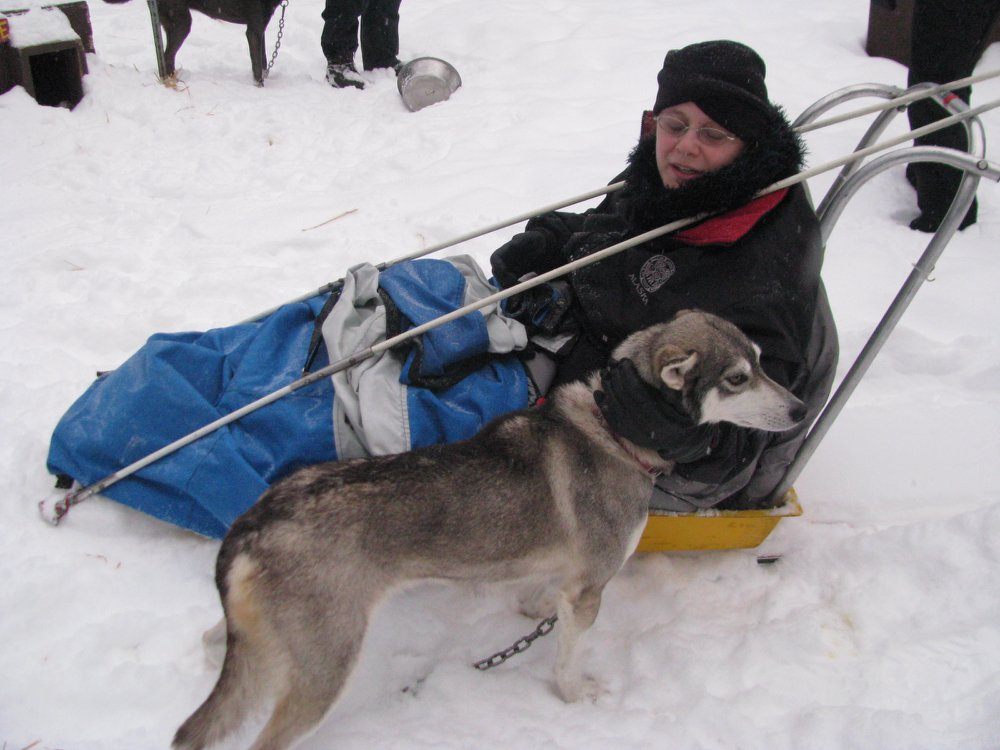
What advice would you give to someone, disabled or not, who’s reading this with a little envy and thinking “I wish I could do that”?
I had to learn to think outside the box. John and I just took a cruise to Greece and Turkey, and I knew it would be hard—there are barely any curb cuts, and there are cobblestones everywhere. So I got one of his friends to come with us.
When we were in Scotland, we had a tender boat to the dock, then you had to go up stairs, these really steep metal stairs. So everyone else went up and then the stairs had these little flaps that they fold down and it becomes a big-ass ramp. Don’t get me wrong, it was still steep, but it was a ramp. It just takes thinking outside of the box.
When I was in Ecuador, I had a special wheelchair—it was still my wheelchair, but you could attach metal poles to it and it becomes like a rickshaw. So I was able to go to parts of the Amazon jungle that way. I’ve been able to go hiking in the mountains of Yellowstone National Park and the jungles of Belize. We went to [Minnesota’s] Boundary Waters in winter and they put me on a dogsled. I got to see the trails in the middle of winter, with the trees covered in snow. Adaptive Sports in Durango gave me a scholarship and I got to go skiing. There are lots of things you can do, but you’ve got to want to do them.
And as much as you may not want to, you have to think about what you need and be really honest about that. And you have to also adapt.… If you choose to focus on all these things that are not accessible, you won’t enjoy what is accessible, and what you can do.
This interview has been edited for length and clarity. If you or someone you know has gone on an accessible adventure, let us know! We’d love to hear about it.



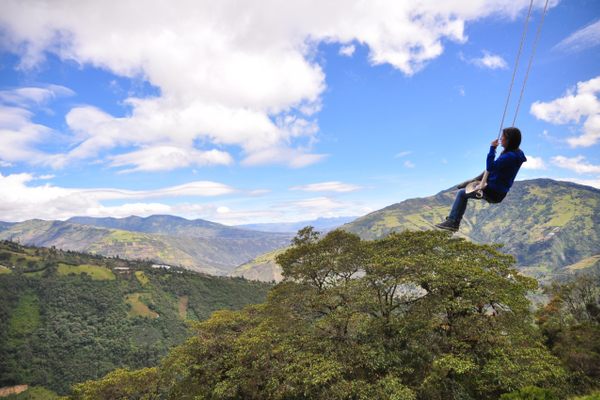








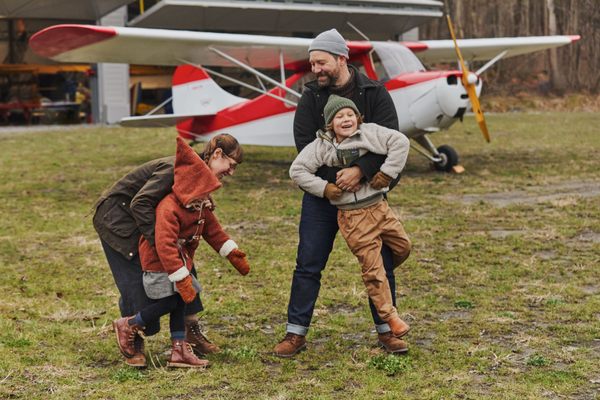


Follow us on Twitter to get the latest on the world's hidden wonders.
Like us on Facebook to get the latest on the world's hidden wonders.
Follow us on Twitter Like us on Facebook